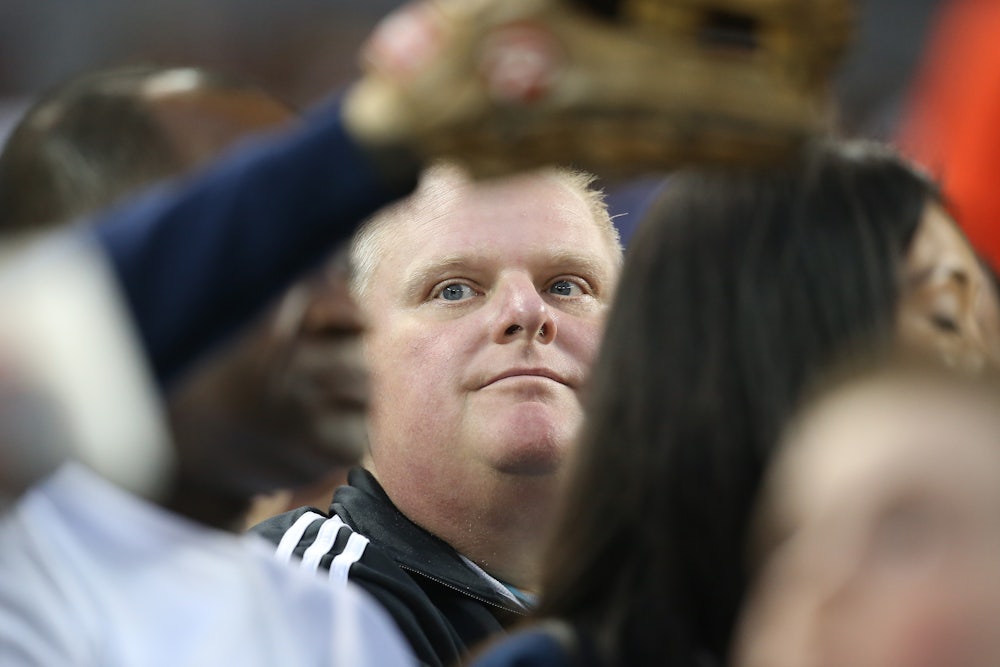Rob Ford, the notorious former mayor of Toronto, was so full of gusto, so much a creature of his appetites, so large a presence not only in his city but around the world, that it’s hard to comprehend that he’s dead. How could someone who was so vibrant succumb to death?
Forty-six is too young for anyone to die, but it is especially sad in Ford’s case because he had much to make amends for. Respect for the truth requires us to admit that he did much damage to his family and his city. The Toronto police repeatedly visited his home on domestic abuse calls. He once humiliated his wife during a press conference by boasting about performing oral sex on her. His children lived under the shadow of his addictions to drugs and alcohol, which made him an erratic and threatening man.
Beyond his family, he was a toxic figure in Toronto municipal politics. He won the mayoralty thanks to his belligerently ignorant populism, fueled by the genuine grievances of the working-class citizens of Toronto, who felt their concerns were being neglected. But in true demagogic fashion, Ford took these well-grounded complaints and refashioned them into a polarizing creed of contempt for cosmopolitan urbanites, reimagined as bicycle-riding downtown elites. Ford practiced a fantasy politics, promising subways that would never get built and wreaking havoc on the city’s budget.
Homophobia was the glue that held the Ford coalition together. He repeatedly expressed disdain for the LGBT community. In the video showing Ford smoking crack—the video that made him a global figure—he could be heard referring to Justin Trudeau, now the country’s prime minister, as a “fag.” During Toronto’s annual pride parade, Ford pointedly left the city to go to his cottage, a striking gesture given that mayors before and after him attended the event, which has become a key part of Toronto’s civic calendar.
It was the homophobia that allowed him to win over immigrant communities that he otherwise insulted. He repeatedly made racial slurs (in the crack video he laments that the football players he coached at a local school were “fucking minorities”). During a barroom conversation, he referred to another patron as a “dumb fucking wop.”
Despite all this, Ford was widely loved by roughly a third of Toronto, his unshakable base of support, made up of working-class immigrants who lived in the suburbs that fringe Toronto, Etobicoke, and Scarborough.
As it happens, I live in the heart of Ford country, in the North Etobicoke ward he represented as a city councillor before and after his mayoralty. Many people in my neighborhood loved Ford and still love him as an avatar of their resentment. They forgave his sins because they thought he was standing up for them against the elites who ran the city. Toronto still has to come to terms with the alienation that Ford exploited and worsened, but did not create.
The one time I saw Rob Ford in the flesh was last October, right before the national election that brought Trudeau to power. The Ford family was hosting an event in North Etobicoke to rally the Conservative Party. Already stricken with the cancer that would kill him, Ford wore a track suit, looking guarded but also surprisingly sturdy. He was an ox of a man, and you could still imagine him defeating the disease that was eating away at him.
If he had lived longer, Ford might have had a chance to fix his life, to heal the wounds he had inflicted on his family. One promising sign in his last few months was that he seemed to have gotten a grip on his addictions. If he had lived longer, he could have done more to give his children what they deserved: a sober and responsible father. He did apologize for his racist remarks but never came to terms with the poisonous homophobia that was his political stock-in-trade. Rob Ford deserved a longer life, to earn a redemption that escaped him.
